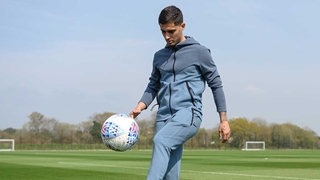
I think we're in a really quickly developing landscape around Disability Football right now.
When you look at our new strategy, whether it relates to wider society and disabled people or the elite end of the game, the challenges and barriers to people participating in football remain very similar.
For us, this this strategy works across both grassroots and elite football and is about continuing the journey we’ve been on in recent years but building on the momentum.
It's amazing to see what the next step of para football might be like, from our action plan and positive initiatives to drive change, but it’s important to recognise that there's still a lot that needs doing.
Even at the elite end, there are aspects such as accessibility of information, ensuring we've got BSL or translators working with our players, or ensuring a player's specific support needs are met.
That’s the same across the full pathway and these are the things we need to learn, evolve and develop so that we can continue to shift the programme into that elite performance sphere, which is where we want to head.
I see this plan as joining what could be seen as two separate dots in terms of grassroots participation and elite level.
We want to start addressing some of those challenges that are going to have a positive impact at the very top, and if we can make sure that more players are then available for selection for a senior England para team, we'll be in a much stronger position.
When you look at the steps in the Football Without Limits plan, it's still quite shocking in terms of where activity levels are in the disability sector.
We can play a role in driving real change, not just in the football world. but in the wider community as well, whether that’s through the inspirational performances of our players or the stories behind each and every one of them and how they came to represent England.
That’s been one of the major aspects of our England teams, because we know that if individuals with an impairment aren't seeing or hearing from others who have a similar impairment doing what they want to do, it creates a barrier towards actually trying to go and achieve it.
If you look at the last 18 months, some of those player stories have generated vast interest and really reached every corner of this country. Not only does it provide a relatable story for kids starting out on their own para football journey, to hear what others have been through, what they're experiencing and where they're at, but it's just a really powerful thing which brings everything that we do to life and is fundamental to this strategy.
I'm a I'm a big believer that sport is a vehicle to do greater good for others. Of course we want to win tournaments with our England para teams and I know we're well along that journey, but we also know the positive impact that can have across the country and it also provides a vehicle for us to really drive societal change.
If you talk to any of our players or staff, that's a real driver for why they do what they do.
For us, this is bigger than football and I think this strategy shows that is the same across the FA really, which is absolutely critical to initiate change.









